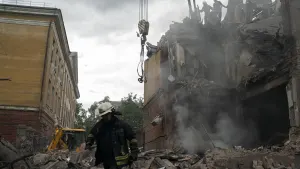More Stories
Ukrainian President Volodymyr Zelenskyy said Saturday that he is committed to pressing for peace despite Russian attacks on civilians that have stunned the world, and he renewed his plea for more weapons ahead of an expected surge in fighting in the country’s east.
He made the comments in an interview with The Associated Press a day after at least 52 people were killed in a strike on a train station in the eastern city of Kramatorsk, and as evidence of civilian killings came to light after Russian troops failed to seize the capital where he has hunkered down, Kyiv.
“No one wants to negotiate with a person or people who tortured this nation. It’s all understandable. And as a man, as a father, I understand this very well,” Zelenskyy said. But “we don’t want to lose opportunities, if we have them, for a diplomatic solution.”
Wearing the olive drab that has marked his transformation into a wartime leader, he looked visibly exhausted yet animated by a drive to persevere. He spoke to the AP inside the presidential office complex, where windows and hallways are protected by towers of sandbags and heavily armed soldiers.
“We have to fight, but fight for life. You can’t fight for dust when there is nothing and no people. That’s why it is important to stop this war,” Zelenskyy said.
Russian troops that withdrew from northern Ukraine are now regrouping for what is expected to be an intensified push to retake the eastern Donbas region, including the besieged port city of Mariupol that Ukrainian fighters are striving to defend.
The president said those defenders are tying up “a big part of the enemy forces,” characterizing the battle to hold Mariupol as “the heart of the war” right now.
“It’s beating. We’re fighting. We’re strong. And if it stops beating, we will be in a weaker position,” he said.
Zelenskyy said he is confident Ukrainians would accept peace despite the horrors they have witnessed in the more than six-week-long war.
Those included gruesome images of bodies of civilians found in yards, parks and city squares and buried in mass graves in the Kyiv suburb of Bucha after Russian troops withdrew. Ukrainian and Western leaders have accused Moscow of war crimes.
Russia has falsely claimed that the scenes in Bucha were staged. It also put the blame on Ukraine for the attack on the train station in Kramatorsk as thousands of people rushed to flee ahead of an expected Russian offensive.
Despite hopes for peace, Zelenskyy acknowledged that he must be “realistic” about the prospects for a swift resolution given that negotiations have so far been limited to low-level talks that do not include Russian President Vladimir Putin.
Zelenskyy displayed a palpable sense of resignation and frustration when asked whether the supplies of weapons and other equipment his country has received from the United States and other Western nations were enough to turn the tide of the war.
“Not yet,” he said, switching to English for emphasis. “Of course it’s not enough.”
Still, he noted that there has been increased support from Europe and said deliveries of U.S. weapons have been accelerating.
Just this week, neighboring Slovakia, a European Union member, donated its Soviet-era S-300 air defense system to Ukraine in response to Zelenskyy’s appeal to help “close the skies” to Russian warplanes and missiles.
Some of that support has come through visits by European leaders.
After meeting Zelenskyy in Kyiv earlier Saturday, Austrian Chancellor Karl Nehammer said he expects more EU sanctions against Russia even as he defended his country’s opposition to cutting off deliveries of Russian natural gas.
The U.S., EU and United Kingdom responded to the images from Bucha with more sanctions, including ones targeting Putin’s adult daughters. While the EU went after the Russian energy sector for the first time by banning coal, it has so far failed to agree on cutting off the much more lucrative oil and natural gas that is funding Putin’s war chest. Europe relies on those supplies to generate electricity, fill fuel tanks and keep industry churning.
U.K. Prime Minister Boris Johnson also made an unannounced visit to meet Zelenskyy, with his office saying they discussed Britain’s “long-term support.”
In Kyiv on Friday, European Commission President Ursula von der Leyen presented Ukraine’s leader with a questionnaire marking the first step for applying for EU membership. The head of the bloc’s executive arm said the process for completing the questionnaire could take weeks — an unusually fast turnaround — though securing membership would take far longer.
Zelenskyy turned introspective when asked what impact the pace of arms deliveries had for his people and whether more lives could have been saved if the help had come sooner.
“Very often we look for answers in someone else, but I often look for answers in myself. Did we do enough to get them?” he said of the weapons. “Did we do enough for these leaders to believe in us? Did we do enough?”
He paused and shook his head.
“Are we the best for this place and this time? Who knows? I don’t know. You question yourself,” he said.
More from News 12
1:37

Election of Donald Trump stokes both hope and concern among Brooklyn's Ukrainian community
2:11
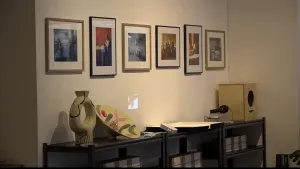
Ukrainian artists' Brooklyn exhibit tell the story of their war-torn country
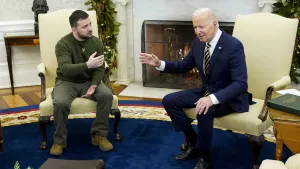
Zelenskyy thanks 'every American,' sees 'turning point'
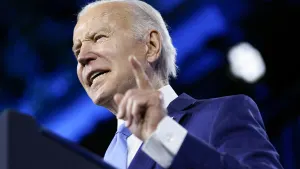
President Biden pledges $2.9B in food security aid amid Ukraine war
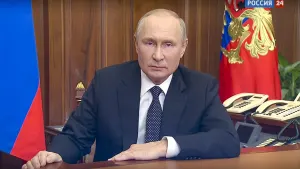
Putin sets partial military call-up, won’t ‘bluff’ on nukes
1:04
